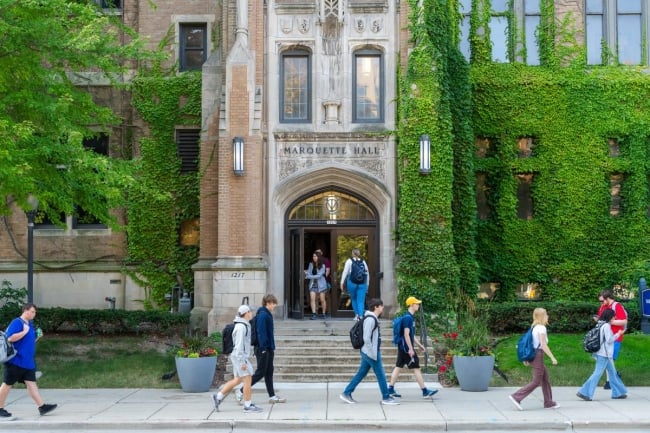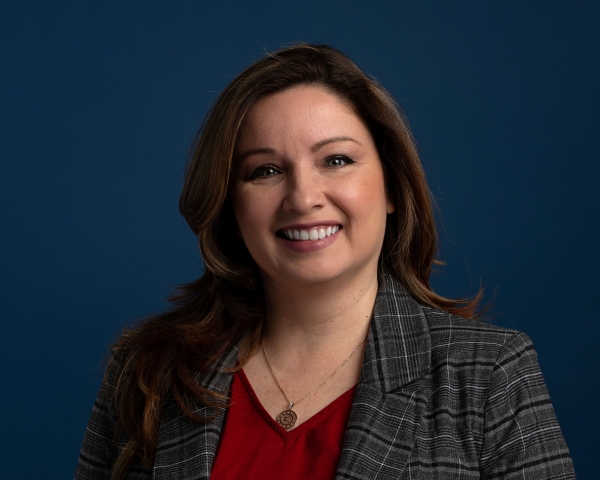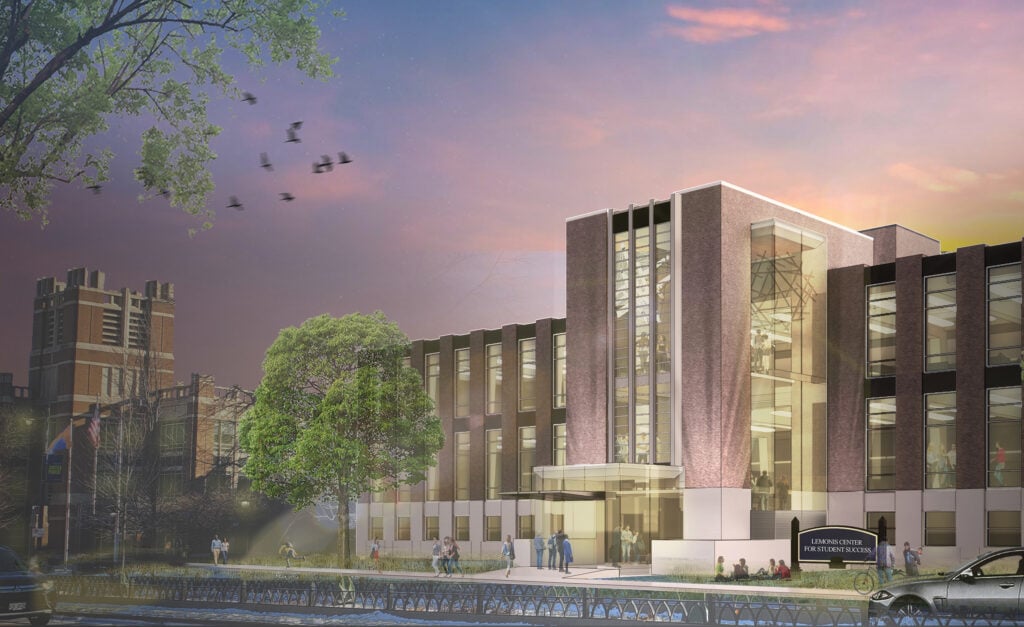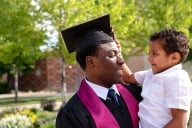You have /5 articles left.
Sign up for a free account or log in.

The new Lemonis Center for Student Success at Marquette will unify institutional offices that support learners with their academic and personal goals.
Marquette University
As an undergraduate student at Marquette University, Marilyn Jones was overwhelmed. A first-generation scholar who emigrated from Costa Rica with her parents at age 12, Jones was a bright student and a great scholar, but she wasn’t sure how she fit into a place like Marquette or whom she could turn to for help.

Marilyn Jones, director of the Lemonis Center for Student Success at Marquette University
Marquette University
Now, as the inaugural director of the Lemonis Center for Student Success at her Milwaukee-based alma mater, Jones and her team are striving to reach students like herself, encourage support-seeking behaviors on campus and connect with partners to provide wraparound support.
Jones spoke with Inside Higher Ed about her new role, the mission of the Lemonis Center and what’s next in its renovation process.
Q: How did you get into a career in higher education?
A: Oh my goodness. I was the first one to go to college in my family, so first gen. I went to college and did my sociology and Spanish B.A. and then suddenly was like, “Oh, there’s a thing called like graduate school.” People at Marquette—I graduated from Marquette twice, for my undergraduate and for my master’s—and my mentors, they were like, “You should continue.”
I fell in love with literature—Latin American literature, Spanish literature. There were people there who said, “You should keep going.” And sure enough, I signed up for the master’s program. They had a TA position and I started teaching, and I just fell in love with that interaction between learner and educator.
I always felt like I was learning with students. They were always informing who I was, and they just helped me grow so much. I love that part of the job. I love being able to share knowledge with others, but also feed from their knowledge, since there’s so much to share. Their experiences, their ideas are so valuable, I just fell in love with that.
One thing led to another; I’ve been in higher ed for more than 20 years. Until recently, I was a faculty member at Cardinal Stritch. This is a new direction in my life, but I think it aligns really well with the work that I was previously doing, which was supporting students in the classroom and outside of classroom—I was very engaged with student organizations [and] what was happening on campus. It was a perfect fit for me.
Q: What is your new role and how does it fit into the institutional vision?
A: We have a 10-year comprehensive strategy that is centered on continuing to provide our excellent education and experiences that are meaningful and engaging and that [support] student success. Recently, especially with COVID, we created this whole new student success strategy.
With that, the idea of the center was born with our donor Marcus Lemonis. And it’s now part of those 11 initiatives under student success strategy. The center itself is something that’s evolving. The idea is that we have integrated services that we provide, a holistic approach to services. I love how the president puts this together. He said, “We have an opportunity to reimagine student success into a physical space.” So that’s what’s guiding my work.
It’s become three things, the center: it’s the type of services that we will provide to students, it’s a central hub for resources, but it’s also a place where we connect students. We’re a campuswide network of support, and we’re coordinating with different areas.
We have the people at our [future] center, and we have what we call satellite agents so we’re connecting across campus and bringing all of these services into the center because our goal is to really reverse that dynamic [that] the students are in charge of finding out what’s available to them. That was the hardest thing for me [as a student]; I was very comfortable within my [educational opportunity program] … with the services because that was there. But I didn’t venture out much to see what other support, what other resources were on campus for me. And I think we’re trying to do that with the hubs. That’s one thing.
The other thing, reimagining student success into a space, is how do students feel, how do our faculty and staff feel about this? So again it’s the hub, then it’s the engagement and mentorship piece. And then the third is, how do we help students feel in the center?
We have anchor programs or initiatives, seven of them. We want to make sure that we provide academic and nonacademic services and support. In terms of academic, we have tutoring, we have academic coaching, career services is also key. And part of that, that student experience, especially early on, students figuring out what to do with their majors, transfer skills—what if they switch from one college to another? What’s the next step? So we provide academic and nonacademic support from the first moment there, from the moment they step on campus, to their first destination.
But beyond that, too, is rethinking the way in which students ask for help. We have this new initiative that’s called the Ask Me desk. So at our center, in addition to offices, educational services there and career services, we have a desk on our main floor where students are going to be welcomed and invited to stop by and ask questions.
If they’re struggling with something, if they don’t know where to go for something, if they just need help, we’re asking them to come here. Our goal is to refer them to the right area or person, take them if needed … We want them to not feel scared, we want them to not think, “You only ask for help when you’re struggling.” At any point of your journey, we want to be there for you and connect you to the people [who can help].
This has been a very exciting initiative. And as you can imagine, it’s not just the center, it’s a campuswide student success initiative—we’re thinking about meeting the students where they’re at.
But another thing is, how do we create that capacity for our staff and our faculty to do this work? They’re so busy already doing what they’re doing, so our job is to facilitate those opportunities, to create those paths and make it easy for them to engage with our students and be there.
Q: How does the new physical center, opening fall 2024, support the office’s mission?
A: This space adds so much value to how we do things and how people feel [about services]. We’re going to have the offices and different types of experiences, like experiential learning and initiatives centered on wellness and mental health, and other things, we have all of that going. But the space itself has been designed to support that work.

The Lemonis Center for Student Success will open in fall 2024, following rennovations.
Workshop Architects
We have over 15 rooms that people can reserve to engage in tutoring, for students to study together, for faculty to come and meet with students and have office hours, to have a counseling center stop by and have a place where they can sit down with students. It’s a lot of space, a lot of rooms for engagement.
And, of course, we have a lot of open space for students to gather. Students asked for places where they can grow in different ways—academically, that’s important. But they were also asking for places to socialize, to feel like they can be themselves, to feel like they can disconnect for a minute throughout the day or take a break and sleep, I don’t know.
We have a lot of furniture that’s comfortable, that can be regrouped. Everything in the center has been reimagined to support students’ success in terms of connection, space.
We’re hoping students will come here and they want to come back a lot. But not just for services, to see and meet people, too. I think that’s very important.
It’s not just that we’re bringing satellite partners—we share the building. This space being renovated, it’s the second floor, the mezzanine and the third level of one of the libraries. We’re connected to Raynor Library [and] we’re going to have so many opportunities for students to navigate these two spaces. The Center for Teaching and Learning is also there, the writing center is also there … we will be leveraging that proximity for opportunities.
Q: What are your goals in your first year?
A: So right now, it’s understanding, having that awareness of who we are as an institution. Who are our students? What are some of those needs? What are those needs that we can address at the center? And how do we collaborate with others?
Some of our goals, for example, [involve] how do we connect with students who are not more likely to connect with these services? So how do we better serve commuters, first-gen students—who may or may not be connected, to a cohort who are not anchored, as we call them, and are not connected to a specific program like I did with TRIO, the EOP or with the honors program or etc. How do we reach them?
If your student success program has a unique feature or twist, we’d like to know about it. Click here to submit.








